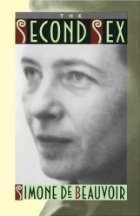The Second Sex
Simone de Beauvoir
1949 (2010 translation)
HQ1208 .B352
Just to give some idea of how big this book is, how dense, how many ideas one can encounter in it, here is a list of things I considered writing about but did not. I realize that theoretically this is my blog and I could, if I so desired, use it to write about nothing but The Second Sex for the next several months, but there are other books I’d like to write about here! So, in no particular order…
- De Beauvoir’s righteous takedown of literary writers, especially Montherlant. I particularly like the section on him because she shows that when one group oppresses another and attacks it as weak, the oppressive group is actually attempting to show that it is strong, but actually it demonstrates the opposite. This is described as “pissing on caterpillars;” he can easily terrify a small insect, but the fact that he is spending his time intimidating a being less powerful than himself shows only that he does not feel capable of facing his peers. Similarly, in the works that de Beauvoir eviscerates, the main character seeks out women that he can easily bully in order to show that he is awesome. She’s not impressed.
- De Beauvoir’s explanation of how movie stars and other visible, glamorous women function as hetaeras. I hadn’t heard of hetaeras before; I looked them up and they seem a little like geishas—well-educated performers, whose role has a certain sexual cast to it, whether it actually involves sex or not. (Geishas, of course, could also be men, or so I’ve read; I’m not sure how this ties into de Beauvoir’s argument.) Learning about history is always exciting, and I’m intrigued by the comparison, though I’m not sure whether I buy it or not.
- Her description of the unproductive tedium of a housewife’s life. I’m not convinced that it is really more repetitive and ephemeral than, say, assembly-line work, and I don’t think she gives enough credit here to the importance of women’s work when she talks about, for instance, making jams and jellies. This is real work with actual economic value and I don’t think it should be dismissed so easily. On the other hand, I’m glad she is describing the tedium that many women felt, quite some time before Friedan discovered it.
- Her powerful argument for comprehensive sex education. It’s funny, because she claims that she is not making an argument for sex end and that better education wouldn’t solve all the problems she describes. But when she writes about the ignorance of girls concerning their own bodies, or the unbearable pressures on sexually inexperienced, newly married men and women, or the lack of respect for consent that results from both this lack of education and a general perception of sex as something that women tolerate—the result is a very eloquent argument for better sex education. (If I were making the post, I’d also write about how it is a little frustrating that de Beauvoir goes out of her way to explain why women don’t experience sexual enjoyment under circumstances that I would certainly describe as rape –surely this is obvious?—and how pleased I am that we don’t really use this concept of “frigidity” anymore.)
- The actual discussion question about de Beauvoir’s famous anti-essentialist argument that- “one is not born but rather becomes a woman.” What I find interesting is how carefully she defines what she means by becoming a woman. In some ways it seems less like a description of a category of people and more like a shared idea (although she doesn’t exactly say that explicitly and I’m aware we’re coming soon to writers who do). In any case, it seems there are degrees to which one can resist the process of becoming a woman, or at any rate the process of being identified with “Woman.” And here I’m getting into issues of the translation; apparently the earlier translation used “a woman” where this one sometimes uses “woman,” and from what I’ve read, there’s some controversy about it. I don’t really read French, especially not with that level of nuance, so I don’t feel qualified to evaluate which translation better expresses the meaning of the French text—but I am detecting that it matters.
- The relationships between The Second Sex and other books we’ve read earlier in the Year of Feminist Classics, especially A Room of One’s Own, which I think has goals substantially similar to de Beauvoir’s but approaches them much less directly. The Second Sex is more literary-academic than the others we’ve read so far and includes citations to just about everything. Of course, it’s also true that many of her references are to books in French, so they’re less familiar to an Anglophone like me.
Those are just the things I considered writing about—there are very many more I didn’t consider writing about but perhaps should have. I haven’t seen too many posts about The Second Sex—it’s a difficult book to get through—but I’m hoping more show up as there is really a lot to say.

